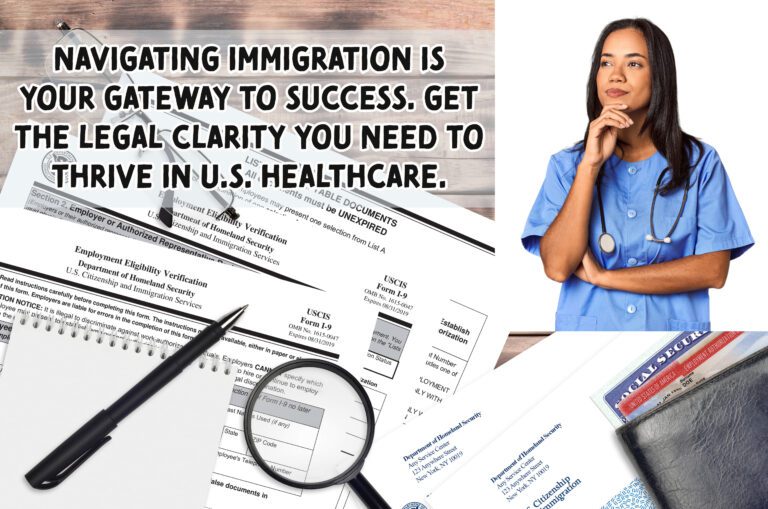Ideal Reader:
International-trained nurses who need help navigating U.S. immigration, visa requirements, and legal processes to continue their professional journey.
Target:
Nurses unsure of how to maintain legal immigration status, renew visas, or apply for permanent residency while working in the U.S.
Introduction:
- What You’ll Learn: This article provides a comprehensive guide to U.S. work visas, legal compliance, and permanent residency options, specifically designed for healthcare professionals.
- Problems It Solves: Simplifies the complexities of U.S. immigration for international nurses, offering practical advice on maintaining legal status and pursuing permanent residency.
Key Questions Answered:
- What visa options are available to international nurses?
- How do I maintain legal status and renew my visa?
- What steps do I need to take to apply for a green card or permanent residency?
Shifting the Focus Beyond Initial Visa Approval
Challenging Assumptions:
Many international nurses assume that obtaining a work visa is a one-time process, overlooking the importance of maintaining legal compliance, renewing visas, and eventually applying for permanent residency (U.S. Citizenship and Immigration Services [USCIS], 2020). Immigration isn’t just about the initial visa—it requires ongoing attention to legal obligations, visa renewals, and long-term residency planning.
Reframing the Idea:
Achieving legal compliance in the U.S. is an ongoing process. Nurses must stay informed about visa regulations, expiration dates, and pathways to permanent residency to secure their long-term career success in the U.S. (U.S. Department of State, 2020).
Navigating U.S. Immigration for International Nurses
1. Visa Options for International Nurses:
There are several visa types that allow international nurses to work in the U.S., including the H-1B visa (for specialty occupations), TN visa (for Canadian and Mexican nurses under NAFTA), and EB-3 visa (for skilled workers seeking permanent residency) (U.S. Department of State, 2020). Each visa has specific eligibility criteria and application processes, so it’s crucial to choose the one that aligns with your career goals.
Learn more about visa options for international nurses here.
2. Maintaining Legal Work Status:
After obtaining a work visa, it’s essential to keep track of its expiration date and ensure timely renewal. Visa renewal processes vary depending on the visa type, and late applications can jeopardize your legal status (U.S. Department of Homeland Security, 2020). For instance, H-1B visa holders typically need to renew their visa every three years, while TN visas must be renewed annually.
Discover more about maintaining legal status here.
3. Pathways to Permanent Residency (Green Card):
The EB-3 visa is a common pathway for nurses seeking permanent residency in the U.S. This employment-based visa allows skilled workers to apply for a green card, which grants permanent residency and eliminates the need for future visa renewals (USCIS, 2020). The process requires employer sponsorship, which involves labor certification to prove that hiring a foreign nurse does not negatively affect the U.S. job market.
Learn more about the EB-3 green card process here.
4. Legal Rights of International Nurses:
As an international worker, you are entitled to the same legal protections as U.S. citizens under labor laws. These protections include fair wages, safe working conditions, and freedom from discrimination based on race, gender, or nationality (U.S. Department of Labor, 2020). Understanding your rights ensures that you can work safely and legally without being exploited.
Read more about labor laws and protections here.
5. Seeking Legal Advice:
Navigating U.S. immigration can be complex, and legal assistance is often necessary. Immigration lawyers or specialized agencies like the Commission on Graduates of Foreign Nursing Schools (CGFNS) can help you understand the intricacies of your visa status, renewal options, and green card applications (CGFNS International, 2020). Legal support ensures you stay compliant with U.S. laws and reduces the risk of visa issues.
Learn how to seek legal assistance here.
Call to Action: Secure Your Legal Status and Plan for the Future
Immigration Self-Assessment:
Use a self-assessment tool to track your current visa status, renewal deadlines, and eligibility for green card applications. This will help you identify which actions you need to take next to maintain legal compliance and plan for your future in the U.S.
Steps to Secure Your Legal Status:
- Monitor Visa Expiration: Keep a calendar with your visa expiration date and begin the renewal process at least six months in advance (U.S. Department of Homeland Security, 2020).
- Explore Permanent Residency Options: Speak with your employer about the possibility of sponsoring your EB-3 green card application (USCIS, 2020).
- Seek Legal Guidance: Consult an immigration lawyer or agency to understand your visa options and ensure you are in full legal compliance (CGFNS International, 2020).
Addressing Concerns
Common Objections:
- “I don’t have time to focus on legal paperwork while working full-time.”
- “The immigration process seems too complicated.”
Response:
Ignoring legal requirements can put your career and residency at risk. Although the immigration process can be complex, breaking it down into small, manageable steps will help you stay compliant and avoid potential legal issues. Legal resources and support are available to guide you through the process (U.S. Department of Labor, 2020).
Take Action to Secure Your Immigration Status
Start Today:
Begin by reviewing your current visa status and its expiration date. If your visa renewal is due soon, start gathering the necessary documents and contact your employer or an immigration attorney for support.
Plan for the Future:
Consider applying for permanent residency to secure your long-term status in the U.S. This will eliminate the need for future visa renewals and provide more stability for your career (USCIS, 2020).
Visualize a Secure Future in the U.S.
Imagine a future where you no longer worry about visa renewals or maintaining legal status. By staying informed about your immigration options and taking the necessary steps for visa renewals or green card applications, you secure a stable career and life in the U.S. Achieving legal compliance ensures that you can focus on what matters most—your career in nursing and your contributions to patient care.
References:
- Commission on Graduates of Foreign Nursing Schools. (2020). Credentialing services for international healthcare professionals. https://www.cgfns.org/
- U.S. Citizenship and Immigration Services. (2020). Green card for employment-based immigrants. https://www.uscis.gov/green-card
- U.S. Department of Homeland Security. (2020). Visa renewal process and requirements. https://www.dhs.gov/
- U.S. Department of Labor. (2020). Worker protections and labor laws for foreign nationals. https://www.dol.gov/general/aboutdol/majorlaws
- U.S. Department of State. (2020). U.S. visa options for foreign healthcare professionals. https://travel.state.gov/content/travel/en/us-visas.html
Additional Resources :


